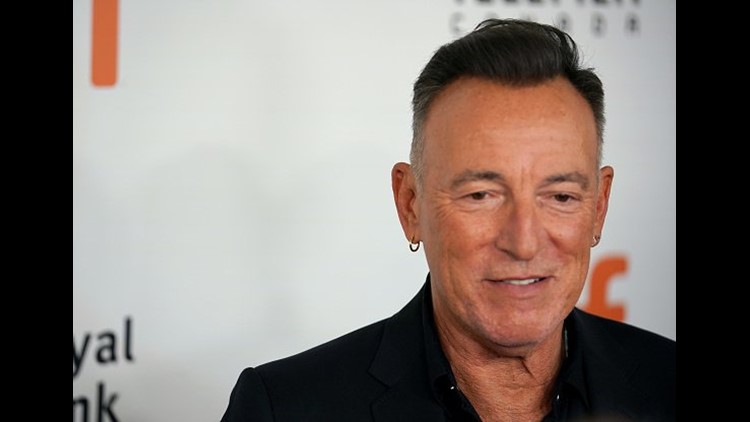Bruce Springsteen has never had a No. 1 hit on the pop charts.
He hasn’t sold as many records as Billy Joel. He’s arguably not as influential as Elvis or Chuck Berry.
But the Boss, who turns 70 today, is almost certainly the most honored American rock star of all time. (Hey, Bob Dylan is more of a folk singer.)
Over his five-decade career Springsteen has won 20 Grammys, an Oscar, two Golden Globes, a special Tony Award and a Kennedy Center honor, plus numerous American Music Awards and MTV Video Music Awards.
In 1999, he was inducted into the Rock & Roll Hall of Fame. In 2016, President Obama awarded him the Presidential Medal of Freedom, the nation’s highest civilian honor.
And Bruce is still a musical force. Here are seven reasons why.
He writes great songs
Few songwriters are versatile enough to pen epic Dylanesque narratives (“Thunder Road”), playful radio hits (“Hungry Heart”), stark tales of America’s underbelly (the “Nebraska” album) and timely statements of hope (“The Rising”).
His best songs ache with longing and ring with poetry:
The screen door slams. Mary’s dress waves. Like a vision she dances across the porch as the radio plays
Roy Orbison singing for the lonely / Hey, that’s me and I want you only
Don’t turn me home again, I just can’t face myself alone again
And his most urgent anthems, like “Badlands” and “Born to Run,” can’t help but quicken your pulse.
His live shows are legendary
Nobody has ever gone to a Springsteen concert and complained they didn’t get their money’s worth.
He sings every song like it’s his last. He spins yarns. He crowd surfs. He climbs atop his piano and exhorts the crowd with the fervor of a tent-revival preacher.
His famously exhaustive performances can leave audiences enraptured — and drained.
At an age when many rock stars are long since retired, Springsteen routinely keeps rocking late into the night. At a 2016 show in Philadelphia — at the age of 66 — he played for 4 hours and 4 minutes.
He’s not afraid to challenge his audience
Yes, Springsteen is a roots rocker and a traditionalist. You’re not going to hear him rap. But throughout his career he’s made some bold and unexpected moves.
In 1982, on the cusp of broad commercial success, he put out “Nebraska,” a bleak album of acoustic demos. Critics loved it, but it did not sell well. Five years later, after the blockbuster success of “Born in the USA,” he swerved again and released “Tunnel of Love,” a melancholy concept album inspired by his failing first marriage.
He has recorded stripped-down folk albums (“The Ghost of Tom Joad,” “Devils & Dust”), an entire album of folk covers (“We Shall Overcome: The Seeger Sessions”) and a country album (“Western Stars”) with sweeping, orchestral arrangements.
In recent years he also has infused his songs with subtle flourishes of hip-hop (“The Fuse”), gospel (“Rocky Ground”) and Middle Eastern music (“Worlds Apart”).
He slayed the Super Bowl halftime show
In the years after the 2004 Nipplegate fiasco, the NFL grew conservative and booked a string of classic rock acts — including Paul McCartney, the Rolling Stones, Tom Petty and The Who — to play the Super Bowl. Springsteen, in 2009, was arguably the best of them.
“I want you to step away from the guacamole dip! I want you to put the chicken fingers down and turn your television all the way up!” he cried upon taking the stage.
The Boss charged through a typically high-energy “Born to Run,” changed the lyrics of “Glory Days” from baseball to football and punctuated “Tenth Avenue Freeze-Out” with an impressive knee slide across the stage into the cameras.
He’s revered by other musicians
Springsteen’s authenticity, passion and body of work have inspired countless other artists, from Gaslight Anthem to the Killers to Rage Against the Machine.
His songs have been covered by everyone from Patti Smith and the Pointer Sisters to Ed Sheeran (!) and Vampire Weekend.
And in another sign of respect, he has been joined onstage over the years by a Who’s Who of musical royalty: Chuck Berry, Roy Orbison, Paul McCartney, Mick Jagger, Keith Richards, Sting, Peter Gabriel, Billy Joel, Bono, Eric Burdon, Bonnie Raitt, John Fogerty and Eddie Vedder, to name just a few.
He’s open about his vulnerabilities
In recent interviews and in his 2016 memoir, “Born to Run,” Springsteen has been candid about his battles with depression.
The rocker says he’s suffered two emotional breakdowns — one when he was 32 and another when he was in his 60s.
“I have come close enough to [mental illness] where I know I am not completely well myself,” Springsteen told Esquire last year. “I’ve had to deal with a lot of it over the years, and I’m on a variety of medications that keep me on an even keel.”
He’s been a voice for social justice
Whatever you think of Springsteen’s politics (he’s performed at rallies for Barack Obama, Hillary Clinton and other Democrats), there’s no doubting the man’s compassion for the downtrodden.
He’s done benefit concerts for charities that fight hunger and poverty, advocate for human rights, help Vietnam veterans and support numerous other social and environmental causes.
He’s also been an outspoken advocate for LGBTQ rights — remember “Streets of Philadelphia”? — and in 2016 was one of the first artists to boycott North Carolina’s anti-transgender bathroom bill.
* (His biggest hit, “Dancing in the Dark,” peaked at No. 2 in 1984).



